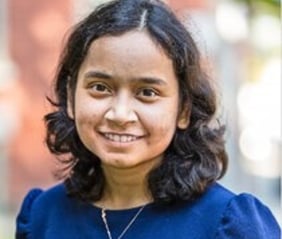
This International Day of Women and Girls in Science we're celebrating some of the incredible women we have in STEM roles here at Newcastle University.
Contents
- Silvia Del Din, Newcastle University Academic Track Fellow
- Anukrati Nigam, MSc Bioinformatics, 2016
- Ayesha Sahar, PhD student, School of Computing
- Shefali Chauhan, British Council STEM Scholar
- Becca Leary, Project Manager
- Ayman Tanveer, Enterprise and Management (REEM) MSc, 2022
There should be no limits to what a woman can do, study or become
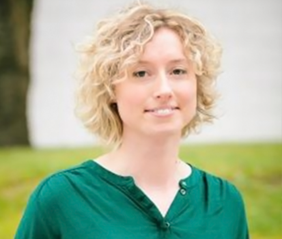
Silvia Del Din, Newcastle University Academic Track (NUAcT) Fellow
What does it mean to be a woman in STEM?
I am a bioengineer working in digital health for transitional clinical research, applying my skills to help and improve people’s lives.
Being a woman in STEM means the ability to show that there are no limits and there should be no stereotypes on what a woman can or “is supposed” to do, study, or become.
Anyone can become anything, there should be no boundaries!
What privileges or challenges do you stereotypically face?
I have always had the privilege to study and work in multidisciplinary and diverse teams where the presence of women in STEM has been pretty significant and well respected, so I feel quite lucky.
When at meetings or presenting my research, sometimes people assume I have another background, rather than engineering, so I have learned to make sure I proudly point out that I am an engineer when I introduce myself!
What role would you like to play in relation to women's rights in your area of expertise?
I would like to do more to make sure that every woman has equal opportunities in our field (academia to be specific). I want to seek support from institutions to really help and enable women to have the same possibilities and chances as men do, with equal pay and equal responsibilities.
Currently, I try my best to support and guide my colleagues to progress in their research careers by sharing opportunities to increase their visibility in our field (both nationally and internationally).
I also strive to be a role model for women in STEM through my role at Newcastle University as the Innovation, Methodology and Application (IMA) theme 'Early Career Researcher representative'.
What advice would you give to young women going into your industry?
Being a woman in Academia can be difficult and sometimes the feeling that you need to constantly prove yourself may be daunting.
What I would suggest is to believe in your skills and strengths, never give up, even if at times you are “unsuccessful”, try not to compare yourself to your peers (whether male or female). Remember that you are unique - one of a kind, and find a mentor or role model who can inspire you and give you confidence. You can definitely make it!
Which women inspire you?
I have had the fortune to have a lot of supervisors throughout my career (from my PhD to post-doc and also in my current position) who are women in STEM, and I have always been fascinated by their leadership, charisma and careers.
In particular, I would like to mention Professor Lynn Rochester and Professor Claudia Mazzà who have always supported me and given me the confidence that I sometimes lacked.
As role models, they have taught me and shown me what a woman in STEM can become, and that we can be successful in academia and research despite some obstacles and bumps along the way.
What do you do to shape the world in your STEM role?
I strive to be a role model for the new generation.
I have recently taken part in a programme at my local radio station in Italy together with other women engineers to talk about our journeys and our career paths. The programme showcased the story of Elena Lucrezia Cornaro Piscopia, the first woman (in the world!) to obtain a degree in 1678 at the University of Padova (where I graduated too).
I would like to show that engineering is not only the stereotypical mechanical or construction engineering, there are many other options (e.g. computer engineering, bioengineering) that can also really make a difference in the world and people’s lives.
Be brave and be fearless
Anukrati Nigam, Commonwealth Shared Scholar MSc Bioinformatics (with Distinction) 2016, Administration and Program Officer at Pegasus Institute, Canada, Data Scientist at Association for Socially Applicable Research, India, and PhD Candidate at the University of Toronto, Canada
What does it mean to be a woman in STEM?
I am proud to be a woman in STEM who has had the opportunity to work on interdisciplinary projects in biomedical science as well as public health and global health. For me, women should get equitable opportunities in STEM with additional support to women from the Global South who are trying to make a mark in the Global North. Furthermore, being a woman should not be seen as a limitation and both abled and differently-abled women in STEM should get opportunities to succeed in STEM.
What privileges or challenges do you stereotypically face?
My privilege has been that I belong to an academic family of scientists and medical professionals. This provided me with a positive environment for learning since childhood. It motivated me to make an impact in the healthcare sector in the long run.
My challenges have been varied, depending on the working culture of the places I have had the opportunity to work at. Unfortunately, not being given credit for my work or being talked over during meetings are some of the stereotypical challenges I have faced in some instances in my career so far.
What role would you like to play in relation to women's rights in your area of expertise?
I would like to promote more research studies focused on women's health, especially in the field of chronic health illnesses and autoimmune disorders. It is important that the accessibility needs of differently-abled women in STEM are met by the places they work or study. There are rules and provisions made for accessibility needs, however, they are not upheld in many cases. I would like to see more women get opportunities in leadership roles in their respective careers. Furthermore, as a Commonwealth Scholar alumnus at Newcastle University, I would like to continue to mentor and support women STEM enthusiasts.
What advice would you give to young women going into your industry?
Be brave and be fearless. You can learn anything you want and have the ability to make a positive impact in the world. Make sure to not compromise on your health while being engrossed in work. Try to make time for yourself, family, friends, and hobbies.
Which women inspire you?
My mother, Dr. Pratibha Nigam, an anaesthetist by profession, has inspired me the most and has been my constant source of strength. Her positive attitude in life, while navigating the hardships, is remarkable. Additionally, I have had the opportunity to be mentored by some great women over the years, such as Aadya Shukla, Erica Vieira, Ilene Hyman and Shampa Sen. They have helped me in networking and guided me in navigating my career, supporting my interests. They inspire me with their dedication towards their scientific interests and their resilience.
What do you do to shape the world in your STEM role?
I work as a data scientist on various interdisciplinary projects relating to mental health, bioinformatics, neuroscience, public health, health economics and health systems strengthening. Furthermore, as an Administration and Program Officer at Pegasus Institute, I work in knowledge exchange, engagement, and coordinating multi-national research projects for a charity at the nexus of peace, global health and environmental sustainability.
Curiosity is the path to innovation, never be afraid of your curiosity
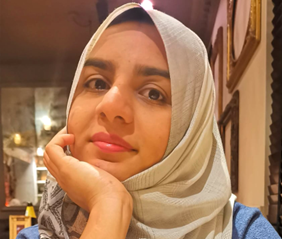 Ayesha Sahar, PhD student, School of Computing
Ayesha Sahar, PhD student, School of Computing
What does it mean to be a woman in STEM?
For me, it means that I am obliged to show the world that women are equally capable of doing science so that one day there can be equal opportunities for us. It is high time we embrace diversity and accelerate our efforts to increase the participation of women in STEM at all levels. No field can prosper without women participating at all levels.
What privileges or challenges do you stereotypically face?
The biggest challenge is being told every day by other people that I should be more focussed on family than science.
What role would you like to play in relation to women's rights in your area of expertise?
I am really passionate about more women joining data science.
More men can be seen working in practical roles so women don't usually get the opportunity to gain practical experience after studying. I dream one day I can create some resources to motivate women to have hands-on learning with programming and show them how we can make our lives easier by using machine learning or data science. This is possible by showcasing that being in science is not only for the sake of a career but for the sake of enjoying its true essence, which is in experimentation.
What advice would you give to young women going into your industry?
With society putting innumerable domiciliary responsibilities on us, it becomes difficult to remain focussed. Always remain affirmed that your participation in science can make a huge impact on society, be sure that you might not get everything right but it is worth it. Curiosity is the path to innovation, never be afraid of your curiosity to try something out of the box. Be ready to grab all your opportunities.
Which women inspire you?
My mother has always been a great inspiration for me. She has always been very technical around the house. I have seen her opening our washing machine and checking why it isn't working. Same for the iron, fan, and other household electricals.
She taught me how to take a stand for my curiosity in the field of computer science. I was a bright student but people often tried to convince me to pursue other fields, as it's common thinking that engineering isn't for girls.
What do you do to shape the world in your STEM role?
My PhD work is interdisciplinary, data science in immunology. The researchers in immunology are collecting valuable data and performing lengthy experiments. With data science, I am working to make this data reusable. This is crucial for the rapid growth of the immunology field. As with Covid-19, we have seen how statistics have played a critical role in getting useful insight in such a short duration.
It gives me immense pride to study environmental engineering
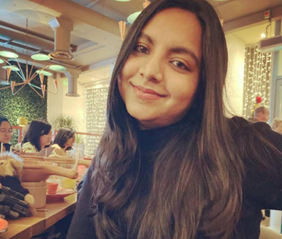
Shefali Chauhan, British Council STEM Scholar in Environmental Engineering
What does it mean to be a woman in STEM?
It is an amazing privilege to be a woman in STEM because I believe that I represent every woman who was shunned and labelled to be less capable to study science and engineering.
Belonging to a disadvantaged background, I faced several obstacles, and it gives me immense pride to study environmental engineering for my master’s degree. Furthermore, it is an impeccable feeling to be a woman in STEM as we have always been less represented in STEM fields. In the future, I will always feel confident to be a part of professional or research communities and will strive to take forward the importance of being a woman in STEM.
What privileges or challenges do you stereotypically face?
Being a woman from a disadvantaged background comes with facing a lot of difficulties, specifically in schooling and education. I was born in a highly conservative family in a small town in India and faced gender discrimination since childhood. I wasn't allowed to study alongside the opposite gender in school, which is a very common stereotype faced by many women in India. However, my mother supported my school education and higher studies and I was always motivated to pursue my dreams. I could always cross those barriers as she motivated me to think outside of the box and achieve my goals, despite adverse circumstances.
What role would you like to play in relation to women's rights in your area of expertise?
I would like to promote and showcase the scientific research and development that is led by women scientists and professors in environmental science and engineering. I would encourage the participation of women in environmental technology, climate change and environmental research.
Which women inspire you?
My mother has always inspired me through her influential personality, strong character, and intelligence. She has always motivated me to bring out the best results, even in difficult situations, and I will always admire her strong, decisive role as a woman. Furthermore, I am always inspired by female researchers and professors as their work is a source of motivation to pursue and understand the current research and contribution of women in STEM fields.
I think it is important to highlight the diverse roles that exist to support STEM
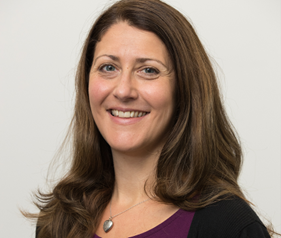
Becca Leary, conect4children (c4c) Project Manager
What does it mean to be a woman in STEM?
I am involved in "Team Science" and work to facilitate and support research. I don't actually have a science background but I think it is important to highlight the diverse roles that exist to support STEM. Day to day I manage a large European project conect4children (c4c) which is building a clinical trial network for paediatrics. The ultimate aim of the project is to bring better medicines for children across Europe.
What privileges or challenges do you stereotypically face?
I am lucky to be surrounded by intelligent strong women, both within the team at Newcastle and the wider EU project. The majority of my colleagues are women. I am lucky to have never faced any challenges being a woman (apart from juggling homeschooling and project management during the Covid-19 lockdown!)
What role would you like to play in relation to women's rights in your area of expertise?
It is important to be aware of how representative committees and leadership operate and to ensure that women have equality of opportunity to lead work.
What advice would you give to young women going into your industry?
Go for it! Even if you don't have a science degree there are still a lot of opportunities to work in STEM.
Which women inspire you?
I have listened to many mothers talk about the impact of their child's rare disease as they fight for treatment. They are all an inspiration to me. To find the energy to fight for their children whilst dealing with the impact of their diseases is incredible.
What do you do to shape the world in your STEM role?
I try to be a positive role model to others and I share openly the challenges I face juggling the challenges of a demanding job with being a mother. I also try to see the positives, and humour, in every day.
I never shied away or underestimated the power of networking

Ayman Tanveer, Enterprise and Management (REEM) MSc 2022, Engineering Tutor at Kaplan
What does it mean to be a woman in STEM?
One of the barriers that I faced during university was being one of the few girls in an engineering class. This is not uncommon for most engineering classes but I learned to work within a diverse group, which added a lot to my experience. But I never shied away or underestimated the power of networking, mostly with the opposite gender as STEM professions are still heavily male-dominated.
What privileges or challenges do you stereotypically face?
Sadly there are still many people who view careers in science or technology fields as being somehow more masculine. Without always meaning to (after all, most discrimination is subconscious) parents and teachers often underestimate the maths abilities of girls right from as young as preschool. This can particularly be the case in certain cultures that are more male-dominated, making STEM less attractive to women and minorities. It damages a girl’s confidence too.
What advice would you give to young women going into your industry?
STEM is promising for women who are passionate and brave enough to advocate their academic choices, and who are proactive and willing to prove their worth. Young women must be diligent about seeking information and opportunities related to STEM careers. Even unique perspectives of individuals switching to STEM from varied backgrounds, like arts and marketing, can bring value to the science industry.
Women interested in exploring tech opportunities should attend events such as British Council and Study UK webinars, an exclusive showcase of scholarships abroad and workshops in tech fields.
Which women inspire you?
I, myself, belong to Pakistan which is the third-lowest performer in gender parity according to The World Economic Forum. The low literacy rate of women in Pakistan, despite women making up almost half the population, is one of the factors in a high gender gap in STEM fields.
However, there are still girls like Arfa Karim. She was a computer prodigy who became the youngest person to become a Microsoft Certified Professional in 2004. She was personally invited by Bill Gates to the Microsoft headquarters in the USA. Arfa was also named in the Guinness Book of World Records. Although she died at the very young age of 16, she is still an inspiration for Women in STEM not only in Pakistan but all over the globe.
You might also like
- meet more of our inspirational women and read their stories
- explore our Faculty of Science, Agriculture and Engineering
- read about our University strengths
- learn more about our thriving global alumni network
